Topic: Board Builders
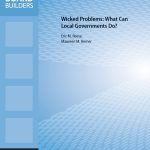
Wicked Problems: What Can Local Governments Do?
Local government leaders face a variety of problems in doing the work of local government and must use different approaches and resources to act in the best interest of their communities. Some issues are difficult to solve, and their root causes are often obscure and can remain untreated. These persistent challenges are “wicked” problems, and they can threaten the vitality of communities. Local governments are well positioned to play a leading role in coordinating the efforts of businesses, nonprofits, citizen groups, and other governments to help maximize resources and take meaningful actions to tackle these issues. This guidebook aims to equip local government leaders with tools to develop new approaches for identifying, understanding, and addressing wicked problems.
…
Continued
Suggested Rules of Procedure for Small Local Government Boards
This publication is designed for local boards, from ABC and social services boards to boards of elections, planning boards, boards of education, and area mental health authorities. It covers subjects such as the use of agendas, the powers of the chair, citizen participation in meetings, closed sessions, minutes, and the use of procedural motions. The book contains helpful appendixes that summarize the requirements for each procedural motion and list other statutes that apply to particular local government boards. Suggested Rules of Procedure for Small Local Government Boards, Second Edition, 1998, was reprinted and reformatted as a publication. This reprint adds to Rule 5 and Rule 23 new material that addresses 2005 legislation pertaining to public comment periods and that was originally included as an errata sheet to the 1998 edition. If you own the original 1998 edition and the 2005 errata sheet, you do not need to buy the redesigned publication unless you want the newly worded text.
…
Continued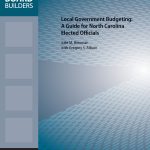
Local Government Budgeting: A Guide for North Carolina Elected Officials
The adoption of a budget is one of the most important activities undertaken by local government officials each year. The budget serves as the elected board’s primary opportunity to establish community priorities and as a tool for planning community services and programs, communicating priorities, and properly managing finances. The budget process, however, with its big numbers, multiple acronyms, and counterintuitive rules, can be confusing.
A book in the Local Government Board Builders series, this guide is intended to remove the mystery of the budget process and to equip North Carolina’s city and county governing bodies with the tools they need to actively participate in the process.
“I am impressed with this guidebook on budgeting. It answered several questions I had as a newly elected commissioner, and it is a great reference for explaining the process on how to reach a budget ordinance.”
Kitty Barnes
Chair
Catawba County Board of Commissioners“This guidebook does a great job of providing context for local government budgeting. Each topic covered makes sense in the budget world, and the book will be helpful to those involved in local government budgeting.”
Scott Fogleman
Budget Director
Town of Cary
…
Continued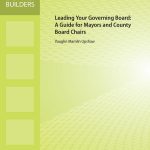
Leading Your Governing Board: A Guide for Mayors and County Board Chairs
This first book in the new series, Local Government Board Builders, focuses on the requirements for and tools used by lead governing officers: mayors of city councils and chairs of county boards of commissioners. Mayors and board chairs hold the keys to effective meetings for their governing bodies and must create effective working relations with public managers and other organizations. This book emphasizes how these leadership roles should work, including tips for setting agendas and maintaining forward motion and participation in meetings. Intangible essentials, such as keeping a fair and impartial manner and respecting professional roles, are also clarified.
…
Continued
The Property Tax in North Carolina
What are the rights and duties of local elected officials relating to the listing, assessment, levy, and collection of property taxes? After reading this book, members of local governing boards should know what they must do, what they may do, and perhaps most importantly, what they cannot do with property taxes.
This guide, part of the Local Government Board Builders series, will help governing boards answer questions such as:
- How is the property tax rate determined?
- When can real property tax values be changed?
- What types of enforced collection remedies are available for property taxes?
- When can property taxes be waived?
…
Continued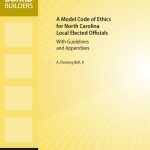
A Model Code of Ethics for North Carolina Local Elected Officials with Guidelines and Appendixes (E-book)
In 2009, the North Carolina General Assembly passed a law requiring all North Carolina cities, counties, local boards of education, unified governments, sanitary districts, and consolidated city-counties to adopt a resolution or policy containing a code of ethics to guide actions by the governing board members in the performance of their official duties as members of that governing board. Each governing board must adopt its resolution or policy by January 1, 2011.
This guidebook, the second title in the Local Government Board Builders Series, is intended to help local elected boards and their staffs develop codes of ethics that meet the requirements of this statute. It includes a Model Code with optional provisions, as well as commentary and discussion questions that boards are encouraged to use in developing and interpreting their own codes. The book is designed to be clear and unambiguous, simple, and easy to read and use.
…
Continued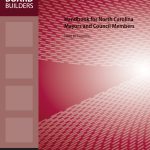
Handbook for North Carolina Mayors and Council Members
This handbook in the Local Government Board Builders Series is intended for elected officials in North Carolina cities and towns, and for persons interested in election to municipal office. It explores the nature of cities and towns in the state, including how they come into existence, how they are run, and how they are financed. It also covers the work of the mayor and council, including the organization of the council, council meetings and actions, and potential liabilities of a mayor or council member.
…
ContinuedGetting the Right Fit: The Governing Board’s Role in Hiring a Manager
Hiring a manager may be the most important decision a local governing board makes. To make sure the new manager will be a good fit for the organization, the board needs to agree on expectations for the new manager and design a process that will enable it to hire the best candidate for the job. This guide, part of the Local Government Board Builders series, provides local elected officials with an overview of their responsibilities in hiring a public manager and outlines the essential steps in a successful hiring process.
“I believe this publication would be an extremely valuable resource for municipalities that are in the process of hiring a manager. Not only can it offer officials immediate detailed instruction and guidance in the process of developing the profile, assessing, and hiring the best candidate, but it is as close as their fingertips for follow up review and future use.”Hartwell Wright
Human Resources Consultant
North Carolina League of Municipalities
“Vaughn M. Upshaw, John A. Rible IV, and Carl W. Stenberg’s Hiring a Manager is an excellent resource … it raises key points that both boards and managers should consider in the hiring process. This publication can increase the likelihood of the fit right for both the board and the new manager.”Michael McLaurin
Town Manager
Town of Waxhaw
…
Continued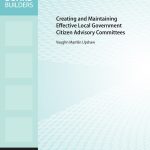
Creating and Maintaining Effective Local Government Citizen Advisory Committees with Downloadable Model Policy and Tracking Forms
Local governments often use appointed policy boards or citizen advisory committees (CACs) to engage people in the democratic process. These boards may be established to respond to community-generated issues, including identifying priorities, considering and recommending actions, and evaluating outcomes. Even though these bodies are used widely, developing and integrating their work into the governmental process remains challenging for many local governments.
Part of the Local Government Board Builders series, this new book and accompanying electronic files provide practical guidelines for local elected officials responsible for establishing policy boards and advisory committees. The book includes tips on evaluating costs/benefits of CACs, worksheets for assessing whether or not to establish a CAC, and options for creating a model policy.
.
“The questions and tips in this book provide a comprehensive framework for assessing the benefits, costs, and challenges of advisory boards. The book will be useful to local governments when creating new advisory boards, and helpful in ensuring boards’ continued effectiveness as they adapt to changing conditions and priorities.”Bernadette Pelissier
Vice-Chair
Orange County Board of Commissioners
“Advisory committees are the core organizational tool by which local government filters and incepts ideas, policies, rules, and practical decision making. These volunteer citizen groups represent the true essence of how government works and are an integral part of our democracy. This book covers the purpose of citizen advisory committees (CACs) along with helpful tips on creating a positive, healthy relationship between these boards and local elected officials and their staff. It provides an in-depth perspective and includes questions that practitioners and local elected officials should consider when creating new CACs or analyzing existing boards. Dr. Upshaw has proffered a simple yet detailed approach for organizing and empowering citizen groups in the democratic process.”Lloyd Wm. Payne, Jr., ICMA-CM
Town Manager
Town of Elkin
…
Continued
How Are We Doing? Evaluating Manager and Board Performance
A guidebook in the Local Government Board Builders Series, this publication describes best practices and offers practical tips for productively evaluating the manager’s and the governing board’s performance. It provides examples of manager and board evaluation measures, rating scales, and formats along with suggestions for ongoing performance improvement. For those already doing manager or board performance evaluations, this guidebook offers suggestions that can strengthen an existing process. It may also be used as a step-by-step manual for developing a new performance evaluation process from the ground up.
“Are you satisfied with your manager? Is your board operating in the best way it can? Most people can answer yes or no to these questions. But can you quantify your answers? Do you have written expectations for the manager or board members? This book is an excellent resource for the essential task of evaluating the manager and the board.” Kevin Patterson – Manager, Scotland County
…
Continued- 1
- 2

